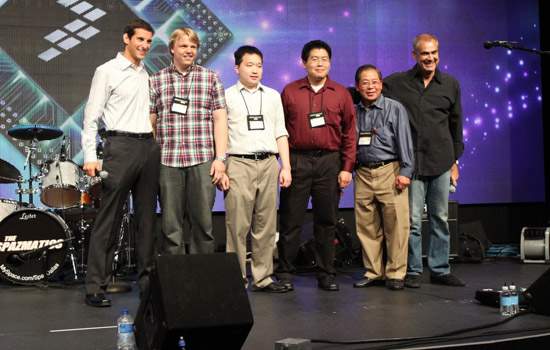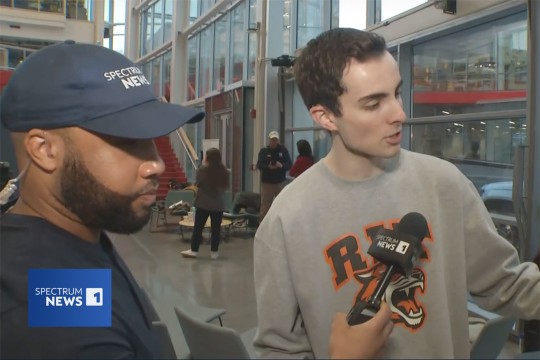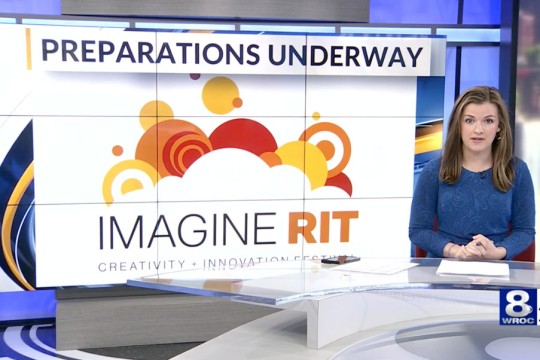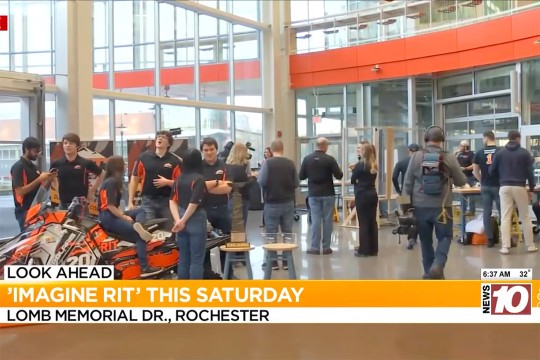Engineering Students Win Grand Prize for Medical Technology Design
Device developed that allows medical data to be accessed anytime/anywhere
Provided by Freescale Semiconductor
RIT computer engineering students won the grand prize for the team’s E-Health Intelligence System at the Freescale Technology Forum “Make It Challenge” that took place June 20-23 in San Antonio. Shown at the awards ceremony are, left to right, head judge Joe Grand; RIT team members Sam Skalicky, Daniel Cheung and Daniel Liu; their project advisor Ken Hsu; and Freescale Semiconductor’s Chief Marketing Officer Henri Richard.
Students from Rochester Institute of Technology were grand-prize winners for their E-Health Intelligence System at the Freescale Technology Forum “Make It Challenge” event on June 22. The system is a health-monitoring device, small enough to fit in a patient’s pocket, and the data can be accessed anywhere in the world by physicians.
“We were very excited to win this,” says Daniel Liu, who graduated from RIT with a dual degree, Bachelor of Science/Master of Science degree in computer engineering. “We put in a lot of effort, sleeping as little as three hours each night to get this project completed in the time limit.”
The E-Health Intelligence System is a low-power mobile device that can collect different vital signs such as heart rate, respiration information or EKG data, Liu explains. It consists of a network of sensors and wireless receivers that can monitor patient vitals and transmit this information to doctors. Physicians would be able to access this medical data in real time from an Android phone or a tablet computer, improving access outside of a clinical or hospital environment.
The student design contest was sponsored by Freescale Semiconductors and held at the company’s national conference in San Antonio, June 20–23. In addition to Liu, the project team also consisted of Daniel Cheung and Sam Skalicky, students in the computer engineering program in RIT’s Kate Gleason College of Engineering. It was the first time the RIT team had entered the national contest.
Contestants were required to use at least one of Freescale’s controller hardware modules for the prototype design. Projects were judged on creativity, innovation, design efficiency and commercial suitability. The system was built using the Freescale Kinetis K60 Tower System that uses a 802.15.4 mesh networking standard in addition to a custom designed software stack, Liu explains.
For the team’s first-place finish in the Tower System category, the students received $3,000. For the grand prize overall, each member will receive a VIP weekend at a NASCAR event to view the new developments and how Freescale Semiconductor’s products are helping to improve the race car’s performance. Also included in the prize is admission to the race, pit access, grandstand seating, accommodations and monetary stipends.
The team expects to continue development, add additional functionality and present the prototype to physicians groups that have shown interest in the product.
“This grand prize recognition solidifies RIT’s position as a top engineering school,” says Ken Hsu, professor of computer engineering and the students’ project advisor. “This was a big competition. We received many compliments on the students’ design. People will know RIT has a strong engineering program, especially in embedded systems design.”















